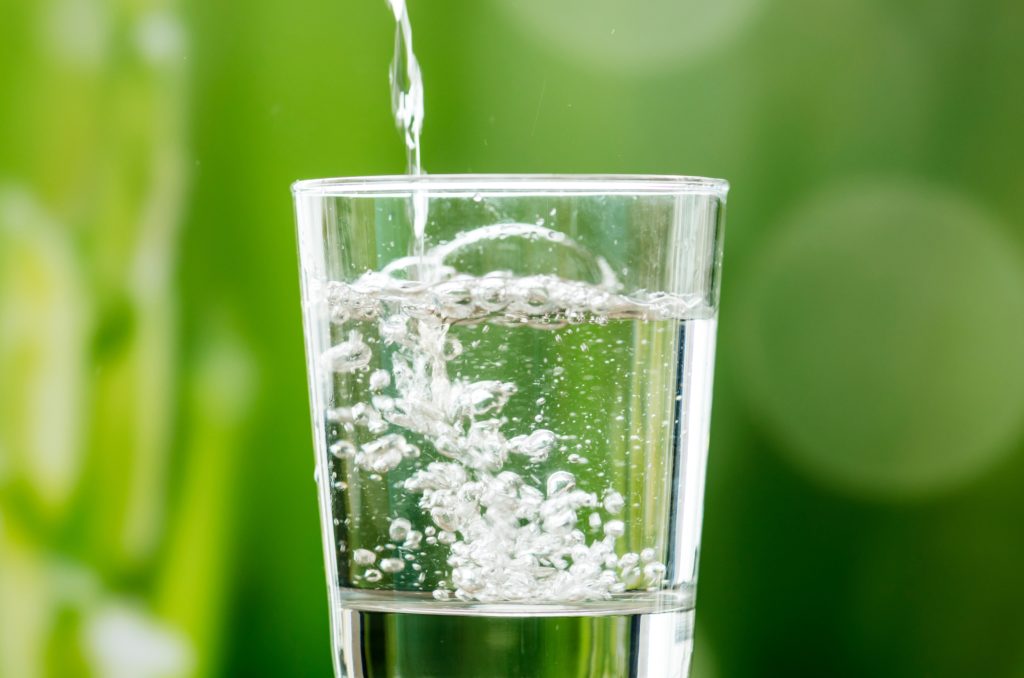Healthy organic, preservative free, antibiotic/steroid/chemical free, whole foods are not the only thing your body needs to be healthy. Water is arguably one of the most important elements we need in our diet. There are many things we can live without, the sun for a short period of time, food for a couple of days, but without water and hydration we will die quickly. Our body has many uses for water: to absorb and transfer our food, fluid in our joints, mucous in our sinuses and lungs, and help regulate body temperature through sweating just to name a few.
How much water do I need?
It is impossible to give a generalization; the amount of water needed varies from person to person and day to day. Our body needs to maintain a balance between how much water our body is loosing between sweating, feces, urine, condensation in our breath, etc, and the amount of water you are taking in. Our body typically requires an estimated eight to ten 8oz glasses of water per day. This is however just an estimate and there are many complicating factors that need to be considered. One, being your age, the younger you are, typically the more water you need. A second complicating factor is being your exposure to high temperatures and dry climates. A third important item to consider is your activity level. Coffee, tea, sodas, and alcohol are all dehydrators and do not substitute for water. It is possible to consume too much water, especially without enough electrolytes, and cause hyper-hydration, which can also lead to serious health problems. Part of knowing how much water to drink is being able to recognize the signs of dehydration. Signs of dehydration are typically:
• Thirst
• Weakness
• Nausea
• Irritability
• Dizziness
• Confusion
• Decreased performance
• Headache
• Cramps
• Heart palpitations

What is in your drinking water?
That is a good question. Legally the water companies are required to make every customer aware of what is in their drinking water, by way of a lab test, once per year. If you want to take the contents of your drinking, or tap, water into your own hands, then have a private lab analyze a sample of your homes tap water. This is an important topic to consider. Many people wonder what is the best water filter, or filter and softener, system. I don’t blame people for being confused on this topic. There are quite a few options out there and every company has their own sales pitch. What I would suggest is to first have your water tested. Then look into the different water systems, and find one that is best at removing what you personally need removed from your home’s water. For example, there are: charcoal water filters, water distillers, ceramic water filters, reverse osmosis systems, atmospheric water generators, ultraviolet water filters, magnetic water filters, infra red water filters, catalytic water filters, ionized water filters, and others. All these water systems have their place and you just need to find out which one is best for your drinking water. Typically, our water may contain minerals, bacteria, or chemicals. For over ten years our government agencies have been focusing on what is being called pharmaceuticals and personal care products, or PPCP’s, in our drinking water. Lab studies have shown trace amounts of: fragrances, lotions, sun-screens, house cleaning products, human and veterinary drugs both over the counter and prescription (such as anti-convulsants, mood stabilizers, antibiotics, sex hormones, etc).

How do these drugs and chemicals get into our drinking water?
There are multiple ways that these chemicals get into our drinking water. One major way is through body fluids or waste, such as urine and feces. Our body, or any animals body (such as cows, dogs, etc), absorb some of the medication and then the rest gets wasted out. Then the waste water goes through a treatment facility, or into our ground water, and eventually back into our drinking water. Similarly, this can happen when people flush medication down the toilet, wash chemicals into storm drains, improperly dispose of chemicals during manufacturing, or rinse cleaning products down the drain. Currently, there is not one water treatment or filter that can remove all these different chemicals. Even some studies, such as the study by the University of Technology Sydney, have shown that bottled water is not much cleaner than tap water, and much more expensive. Even boiling water will not remove the PCPP’s. Some charcoal systems and reverse osmosis systems claim they remove part of the PCPP’s, but not all.
Do these chemicals pose any health concern?
Currently, government agencies are not sure of any health issues. The EPA states that because the amounts found are in the parts per billion, or even trillion, the amount is too small to cause ill health. However, one reason they continue to study this topic, is that we do not know what the long term effects of ingesting trace amounts of these PCPP’s. Also, there has been one study that found that fish exposed to trace amounts of estrogen-like substances had both female and male sex organs.
In summary, dehydration and water is more complicated than many of us think. Generally, it is recommended to drink 8-10 glasses of clean pure water daily, and drink extra water before, during, and after sporting events. As a society we need to take care of our water sources, do not flush pills down the toilet or wash pesticides into the gutter. We need to re-examine our wastewater treatment systems, and our policy of spreading sewage sludge on farmland. We have to continue to monitor these PCPP’s and come up with a better way to remove them from our drinking water.
